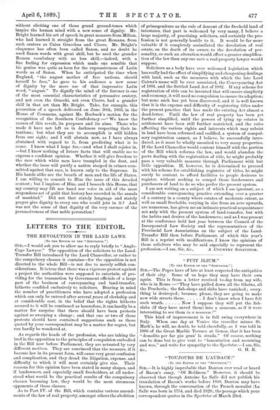LETTERS TO THE EDITOR.
THE REVOLUTION IN THE LAND LAWS.
[TO THE EDITOR OF THE "SPECTATOR."] 'SIR,—I would ask you to allow me to reply briefly to " Anglo- Cape Lawyer." The opposition of the solicitors to the Land- 'Transfer Bill introduced by the Lord Chancellor, or rather to the compulsory clauses it contains—for the opposition is not 'directed to the whole Bill—is not due to merely selfish con- siderations. It is true that there was a vigorous protest against a project the authorities were supposed to entertain, of pro- viding for the transaction by Government officials of a large part of the business of conveyancing and land-transfer, hitherto confided exclusively to solicitors. Bearing in mind the number of practitioners who have adopted a profession which can only be entered after several years of clerkship and at considerable cost, in the belief that the rights hitherto secured to it will be continued as heretofore, it can hardly be a -matter for surprise that there should have been protests against so sweeping a change ; and that one or two of those -protests should have contained suggestions such as those quoted by your correspondent may be a matter for regret, but can hardly be wondered at.
As regards the heads of the profession, who are taking the lead in the opposition to the principles of compulsion embodied in the Bill now before Parliament, they are actuated by very different motives. They are convinced that the measure, if it become law in its present form, will cause very great confusion and complication, and they dread the litigation, expense, and difficulty to which it will most certainly give rise. Their reasons for this opinion have been stated in many shapes, and if landowners, and especially small freeholders, at all under- stood what would be the practical results of the compulsory clauses becoming law, they would be the most strenuous opponents of those clauses.
As to Part IV. of the Bill, which contains various amend- ments of the law of real property, amongst others the abolition of primogeniture as the rule of descent of the freehold land of intestates, that part is welcomed by very many, I believe a large majority, of practising solicitors, and certainly the pro- fession is not generally hostile to it. It would be far more valuable if it completely assimilated the devolution of real estate, on the death of its owner, to the devolution of per- sonality, as such an alteration would effect a greater simplifica- tion of the law than any one save a real-property lawyer would suppose.
Solicitors as a body have ever welcomed legislation which has really had the effect of simplifying and cheapening dealings with land, such as the measures with which the late Lord Cairns's name will be ever associated, the Conveyancing Act of 1881, and the Settled Land Act of 1882. If any scheme for registration of title can be invented that will ensure simplicity and economy, it will need no compulsion to ensure its adoption; but none such has yet been discovered, and it is well known that it is the expense and difficulty of registering titles under the present practice that has made the existing Act almost a dead-letter. Until the law of real property has been yet further simplified, until the powers of tying up estates in settlement have been still further restricted, and the rules affecting the various rights and interests which may subsist in land have been reformed and codified, a system of compul- sory registration cannot, as I believe, be successfully intro- duced, as it must be wholly unsuited to very many properties. If the Lord Chancellor would content himself with the portion of the Bill which reforms the law, and would abandon the parts dealing with the registration of title, he might probably pass a very valuable measure through Parliament with but little opposition. If, however, he is determined to proceed with his scheme for establishing registries of titles, he might surely be content to afford facilities to people desirous to register, without seeking to compel those landowners and purchasers of land to do so who prefer the present system.
I am not writing on a subject of which I am ignorant, as a considerable conveyancing practice extending over a quarter of a century in a county where estates of moderate extent, as well as small freeholds, varying in size from an acre upwards, are numerous, has given me an intimate practical acquaintance not only with the present system of land-transfer, but with the habits and desires of the landowners ; and as I was present at the conference held last year between the Council of the Incorporated Law Society and the representatives of the Provincial Law Associations on the subject of the Land- Transfer Bill then before Parliament, of which this year's Bill is a reprint with modifications, I know the opinions of those solicitors who may be said especially to represent the


































 Previous page
Previous page